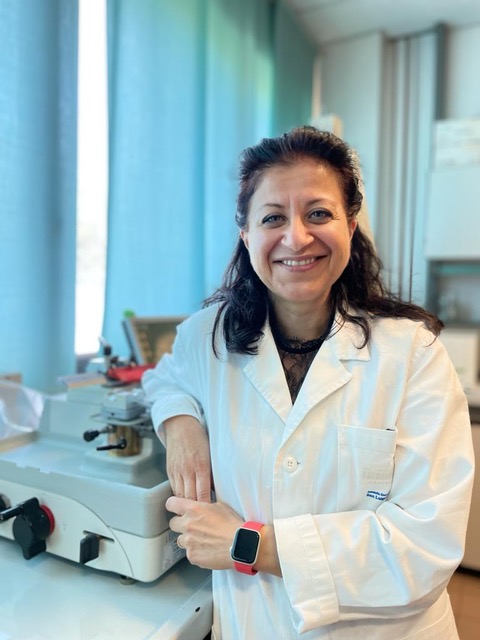WHAT IS YOUR BACKGROUND?
Since my undergraduate trainee I worked on tumor immunology and immunotherapy I got my Master degree in Turin and my thesis aimed at the demonstration that an anti-tumor DNA vaccine “shot” with a gene gun was efficient in delaying, and even cure, smaller established Her2+/neu breast cancers. Then I got the speciality in Clinical Pathology in Turin and moved to the University of Chieti-Pescara where I won a PhD fellowship in Basic and Applied Medical Sciences. This was the only “pause” from tumor immunology as in 2016 I moved back in Turin to join the Tumor Immunology Lab at the CeRMS, Dept of Molecular Biotechnologies and Health Sciences. Here I added my experience to that of the group to further develop novel immunotherapies for the treatment of pancreatic cancer.
WHY DID YOU CHOOSE TO DO RESEARCH ON PANCREATIC CANCER?
It was by chance actually; I was looking for a position in Turin to get closer to my family and the lab was offering one. Immediately after I realized how it’s important to unveil new mechanisms, players and add novel pieces to the big puzzle of the pancreatic cancer. If we, scientists, join our efforts as in the past it has been for breast, colon and lung cancer, we will reach similar success.
WHAT IS YOUR RESEARCH ABOUT?
Some years ago, the lab in which I am working developed a DNA vaccine against one pancreatic cancer-associated molecule, namely alpha-enolase, and I’m focused on designing novel combination to increase its efficacy. I have demonstrated that gemcitabine, a classical chemotherapy drug used in PDAC, increases the efficiency of the anti-tumor response induced by the enolase vaccine, but the potential combinations are really a lot! In addition, I’m working on the development of an ELISA assay to catch autoantibodies that seems to appear very early in pancreatic cancer patients: this could be of some help to anticipate the diagnosis.
WHAT ARE THE RESERCH PERSPECTIVES AND THE IMPACT OF YOUR WORK?
Starting from the last point, it would be very important to anticipate the diagnosis in this badly disease as most of the patients are metastatic when diagnosed and this dramatically decreases the percentage of people eligible for the surgical resection, the gold standard of care. On the other hand, it is also similarly important to develop novel therapeutic strategies more efficient than the conventional ones or that improve the conventional ones. Everyone knows how bad the side effects of the chemo and radiotherapy are; therefore, the possibility to combined them with something that allows decreasing their doses would be of great impact.
WHY IS IT IMPORTANT TO BE PART OF THE IPCC?
I-PCC represents a step forward to succeed in the treatment of pancreatic cancer. It’s a young community which has the ambition to grow and make a great contribution to the scientific and clinical community to fight this “silent killer”. Each of us is eager for sharing own expertise, models, reagents in the attempt to foster research and results in this field.
WHEN YOU ARE NOT IN YOUR LAB WHAT DO YOU LIKE TO DO?
When I’m not working, I would like to read books maybe sipping a spritz (Italian typical aperitif)… but at the moment I’m happy to dedicate myself to Giulia, my little girl, and my family in general.



